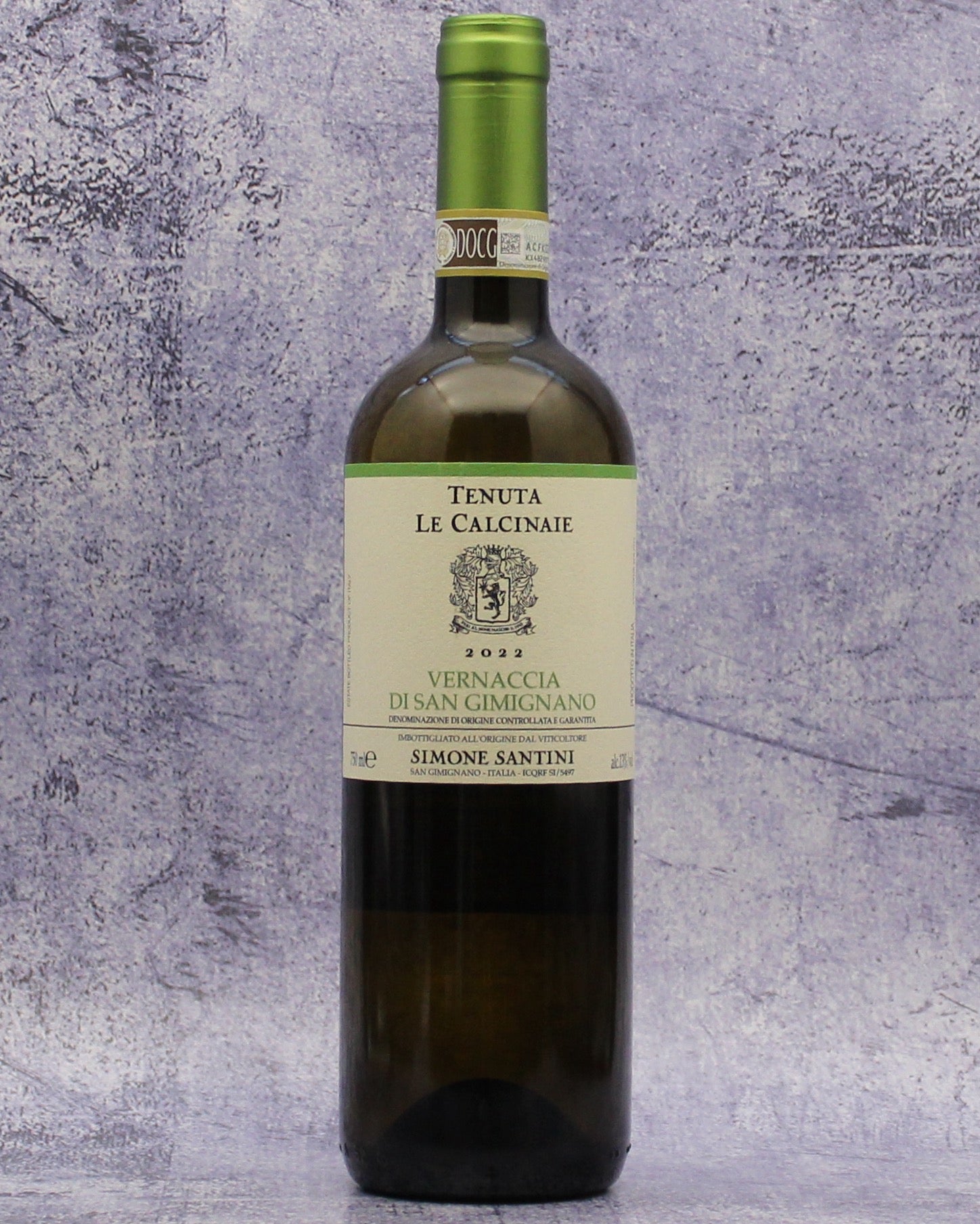Description
From: San Gimignano, Tuscany, Italy
Varietal: Vernaccia di San Gimignano
Taste: The 2022 Tenuta Le Calcinaie Vernaccia di San Gimignano has been well- received for its vibrant and expressive profile. This vintage showcases a bright, crisp character with pronounced notes of lemon peel, green apple, and white flowers. The wine maintains a balance of refreshing acidity and minerality, a hallmark of the sandy, Pliocene-origin soils from which it is grown. It offers subtle hints of tropical fruit, lime, and white pepper, making it layered, rich, approachable, and versatile.
Pairing: For a truly Tuscan experience, try it alongside classic regional dishes such as Pappa al Pomodoro (a hearty tomato and bread soup), Ribollita (a vegetable and bean stew), or Panzanella (a refreshing bread and tomato salad). These dishes complement the wine's bright citrus notes and refreshing character.
Beyond traditional Tuscan fare, consider enjoying it with grilled seafood, such as shrimp or calamari, where its acidity can cut through the dish's natural richness. It also matches well with creamy risottos, especially those featuring herbs or green vegetables like asparagus. For a lighter option, try it with a caprese salad, where the wine's subtle hints of white pepper and lime enhance the freshness of the tomatoes and mozzarella.
Additionally, it can be a delightful pairing for sushi, where the wine's vibrant flavors elevate the delicate textures of the fish. Finally, the wine’s floral and fruit undertones make it a great companion to roast chicken with lemon and herbs or a simple pasta with a light, garlic-based sauce.
Tuscan Bread and Tomato Soup (Pappa al Pomodoro)
By Martha Rose Shulman
About. Tenuta Le Calcinaie is an organic winery nestled in the picturesque hills of San Gimignano, Tuscany. Founded in 1986 by Simone Santini, the estate has grown to be known for producing high-quality wines that reflect the region's unique characteristics. From its inception, the winery has emphasized organic farming practices, ensuring that its wines are both expressive of terroir and sustainable and environmentally friendly. This commitment to organic cultivation earned certification in 1995, and the estate has maintained this approach ever since.
Simone Santini is the passionate founder and owner of Tenuta Le Calcinaie. He established the winery in 1986, initially planting a hectare of Vernaccia vines, marking the beginning of his winemaking. Over the years, he expanded his vineyards to include red grape varieties, such as Sangiovese, which he began cultivating in 1989.
Santini’s background as a "wine technician" is evident in his meticulous care in vineyard management and winemaking. His first commercial release was the 1993 vintage of Teodoro, a 100% Sangiovese wine, followed by his acclaimed Vernaccia di San Gimignano in 1995. Tenuta Le Calcinaie spans 12 hectares today, producing about 70,000 bottles annually. The estate's wines are highly regarded for their purity, with Santini focusing on bringing out the minerality and freshness of the Vernaccia and the vibrant structure of his reds.
The estate's vineyards are spread across diverse terroirs within San Gimignano and the nearby area of Colle Val d’Elsa. Situated at 200-250 meters elevations, the vineyards benefit from good drainage and ample sunlight, creating an ideal environment for growing balanced and aromatic grapes. Santini carefully selects vineyard sites to optimize the expression of each grape variety, with Vernaccia planted in sandier soils to enhance freshness, while Sangiovese and other reds are grown in clay-rich areas to provide structure and depth. This strategic use of terroir, along with the varied soils that include limestone, sand, and fossil deposits, contributes to the unique profile of Tenuta Le Calcinaie's wines.
Santini’s winemaking philosophy is rooted in tradition but also embraces innovation. His practices include organic treatments and the use of minimal additives. For example, his “Ingredienti: UVA” wine is made without added sulfites, showcasing his commitment to producing natural, expressive wines. This balance of tradition and innovation has helped Tenuta Le Calcinaie earn accolades, including recognition for its Vernaccia di San Gimignano, listed among the 100 Best Wines of the World by Wine Spectator.
The area around San Gimignano is celebrated for its historical significance and winemaking tradition. Vernaccia di San Gimignano is one of Italy's oldest and most prestigious white wines, with records of its cultivation dating back to the 13th century. The region's microclimate plays a crucial role in shaping the wines' profiles. The warm, Mediterranean climate, coupled with cooling breezes from the surrounding hills, helps to maintain freshness and acidity in the grapes, even in warmer growing seasons.
Simone Santini’s hands-on approach and deep understanding of organic viticulture have been pivotal to the estate’s success. By allowing the vineyards to express themselves naturally and intervening minimally during the winemaking process, Tenuta Le Calcinaie has produced wines that are both authentic and full of character.
Wine Notes: Tenuta Le Calcinaie's Vernaccia di San Gimignano is produced from 100% Vernaccia grapes cultivated in the "Le Calcinaie" cru in San Gimignano's heart. The vineyard covers 6 hectares, with plantings from 1987, 1999, and 2009. The vines thrive in sandy soils of Pliocene origin, benefiting from a south and east-facing exposure of 220-250 meters above sea level. This setting provides optimal conditions for preserving the freshness and minerality typical of Vernaccia.
The annual production reaches about 40,000 bottles, each hectare yielding approximately 9,000 kg of grapes. After harvest, they must undergo cold settling before
fermenting in stainless steel tanks at a temperature of 16°C for three weeks. The wine matures on its lees until the following spring, enhancing texture and complexity. With an alcohol content of 12.5%, this Vernaccia showcases the bright, mineral-driven characteristics of the terroir, delivering a crisp and well-structured profile.

